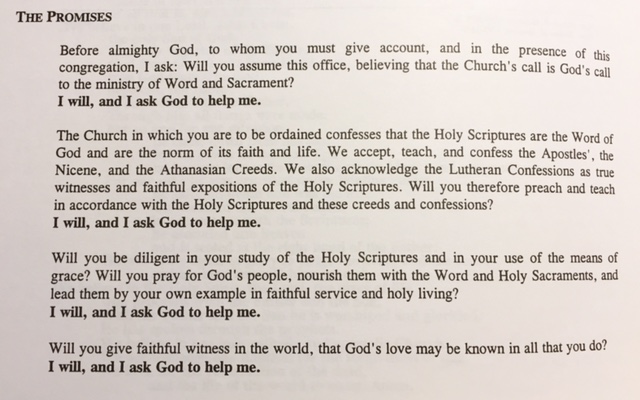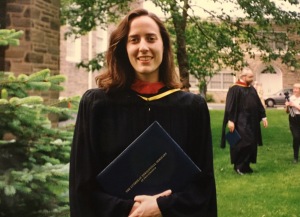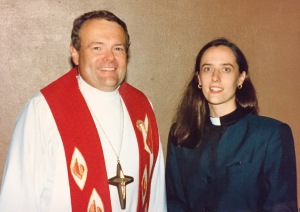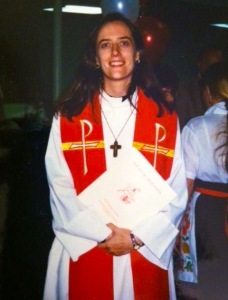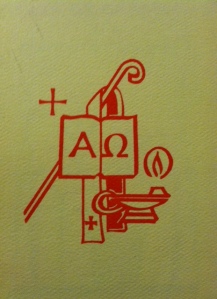This post is part of my reflecting on the 20th anniversary of my ordination this year…
Part of seminary education in my denomination (ELCA) is called CPE (Clinical Pastoral Education). Usually this is a summer spent working as a hospital chaplain. CPE is intense. You are being a hospital chaplain, but you are also part of a group of others doing their CPE along with you and you meet constantly to debrief your experiences. In a hospital setting you’re confronted left and right with life and death decisions, with life-altering and devastating illnesses and accidents, and there is grief and pain mixed with joy and relief all around. It’s good to examine your own stuff while you’re confronting other’s stuff – so that you don’t confuse your stuff with theirs (or at least learn to recognize it when you do!).
Most of my day-to-day chaplaincy work was done on general medical floors. Every once in a while we would help cover for each other if one of us had to be out, and we ALL took turns being on-call since this hospital had a chaplain available to patients 24 hours a day, seven days a week. We had an on-call room to sleep in just like doctors – and we all prayed when it was our turn that it would be a quiet night. It never was for me. Not only that, but every single time I was on-call I was paged to be with the one “set” of patients I dreaded the most – the children. Every single time. Without fail. It’s never good when the chaplain (or any other care provider) is paged at 2am. But when I would look at the number paging me and realize it was from one of pediatric units (Peds, NICU or PICU) I would just feel sick to my stomach.
The encounter that has stayed with me the most all these years is with a baby named Amanda. Amanda was almost six months old but had never left the NICU. She was born quite premature and had multiple problems. Her mother and father, maybe in their mid-twenties, had just gotten the bad news that Amanda had yet another brain bleed and they wanted to talk to somebody. The nurses explained to me that Amanda’s prognosis for survival was extremely poor, and that the parents were trying to process the information.****
I shook in my shoes. Before I could be present with them I had some serious praying to do for myself. Obviously there was nothing I could say that would make this better. Their little girl was dying, and they were trying to process this news. What was there to say?
I went over to them and introduced myself. I let them share with me what they were able to process to that point (sometimes it takes a while for news that tragic to sink in. That’s another thing pastors do – journey with people as they unpack the realities of life and death). I understood more than they were able to what was happening, but you can’t push people. I met them where they were, just as God meets US where WE are. I told them I was sorry for what they were going through, with what Amanda had gone through in her short life. I looked at their little girl, obviously very sick, but still so beautiful, and told them that God was with them no matter what. I told them that God had been with them all along, and that God would continue to be with them in the uncertain future. They were not alone, even if they felt that way. That it was okay to question, be angry, be weak, to cry, to scream – God would never leave. My prayer with them was that they would feel God’s love embrace them and their daughter even in their pain. We sat together for a long time, touching Amanda, touching each other, with a lot of silence.
Some people call this kind of ministry the ministry of presence. Meaning, there isn’t anything concrete “to do.” You’re “just there.” It’s hard to just sit with that kind of intensity. It’s frustrating for a pastoral person who naturally wants to do something. You feel helpless and useless, like you’re doing nothing. In reality, nothing could be farther from the truth. I don’t know what happened to Amanda or her parents. But I know how I have felt when on their end of grief and sorrow. I know what it’s like to feel alone, to grieve, to doubt, to be sitting in the patient’s or family’s seat in the hospital – and I know it’s NOT nothing to have another human being sitting beside you. It can be a huge comfort. Having a physical pastoral presence to represent God’s presence with us is NOT nothing.
Amanda was my first serious experience as a future pastor with the ministry of presence. It’s still not easy even all these years later. It’s not supposed to be. But it’s important to remember that it’s NOT nothing. Thank you Amanda. You helped this person be a better pastor.
****This is where ministry takes place. This is when you want people to realize that sending their money to some televangelist so he can buy a new jet is just GARBAGE. This is when you want people to realize that buying the best-seller of a preacher living in a mansion is just GARBAGE. Amanda and her parents are ministry. THIS is what regular everyday pastors are called to do day in and day out. We brave the 300 pound gorilla in the room, which is death. We sit with people as they mourn and doubt, as they question their own worth, struggle with addictions, sickness, anger, depression. We hold hands with those who bury their children and lose their homes and can’t put food on the table. Next time you think about sending a check to a “mega-ministry” half across the country, think of the church down the street whose pastor probably makes pennies, but whose doors are always open when you need a hand to hold. Just my two cents…

